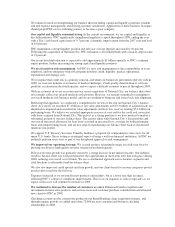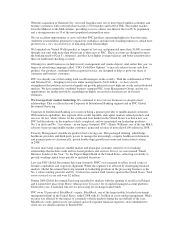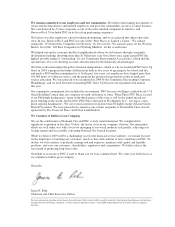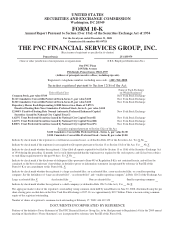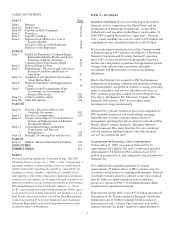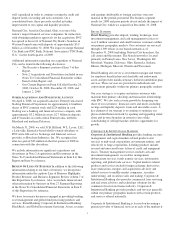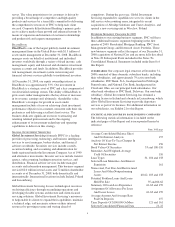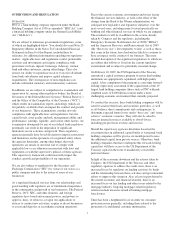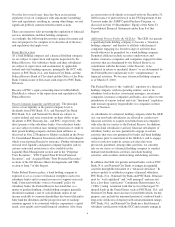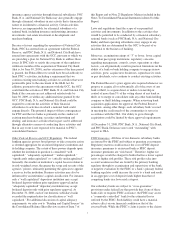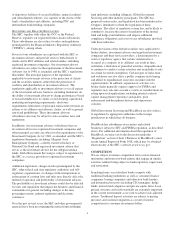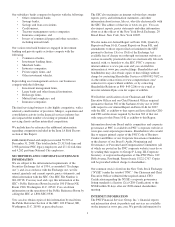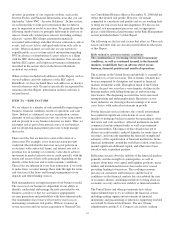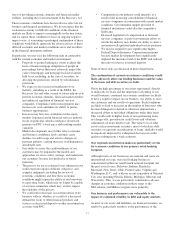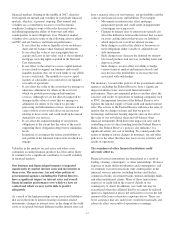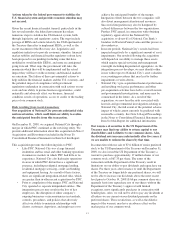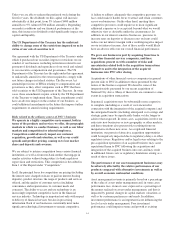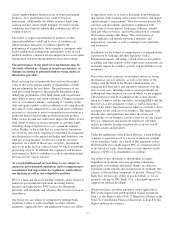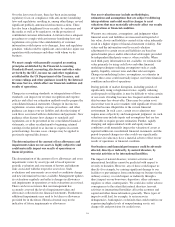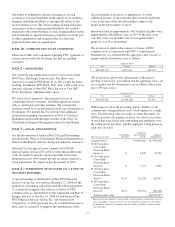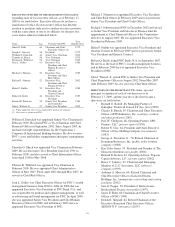PNC Bank 2008 Annual Report Download - page 12
Download and view the complete annual report
Please find page 12 of the 2008 PNC Bank annual report below. You can navigate through the pages in the report by either clicking on the pages listed below, or by using the keyword search tool below to find specific information within the annual report.
of depositors, holders of secured liabilities, general creditors
and subordinated creditors, it is superior to the claims of the
bank’s shareholders and affiliates, including PNC and
intermediate bank holding companies.
S
ECURITIES AND
R
ELATED
R
EGULATION
The SEC, together with either the OCC or the Federal
Reserve, regulates our registered broker-dealer subsidiaries.
These subsidiaries are also subject to rules and regulations
promulgated by the Financial Industry Regulatory Authority
(“FINRA”), among others.
Several of our subsidiaries are registered with the SEC as
investment advisers and provide services both directly to
clients and to PNC affiliates and related entities, including
registered investment companies. Our investment advisor
subsidiaries are subject to the requirements of the Investment
Advisers Act of 1940, as amended, and the SEC’s regulations
thereunder. The principal purpose of the regulations
applicable to investment advisers is the protection of clients
and the securities markets, rather than the protection of
creditors and shareholders of investment advisors. The
regulations applicable to investment advisers cover all aspects
of the investment advisory business, including limitations on
the ability of investment advisers to charge performance-based
or non-refundable fees to clients; record-keeping; operational,
marketing and reporting requirements; disclosure
requirements; limitations on principal transactions between an
adviser or its affiliates and advisory clients; as well as general
anti-fraud prohibitions. These investment advisory
subsidiaries also may be subject to state securities laws and
regulations.
In addition, our investment advisory subsidiaries that are
investment advisors to registered investment companies and
other managed accounts are subject to the requirements of the
Investment Company Act of 1940, as amended, and the SEC’s
regulations thereunder, including Allegiant Asset
Management Company, a wholly-owned subsidiary of
National City Bank and registered investment advisor that
serves as the investment advisor for the Allegiant mutual
funds. Global Investment Servicing is subject to regulation by
the SEC as a service provider to registered investment
companies.
Additional legislation, changes in rules promulgated by the
SEC, other federal and state regulatory authorities and self-
regulatory organizations, or changes in the interpretation or
enforcement of existing laws and rules may directly affect the
method of operation and profitability of investment advisers.
The profitability of investment advisers could also be affected
by rules and regulations that impact the business and financial
communities in general, including changes to the laws
governing taxation, antitrust regulation and electronic
commerce.
Over the past several years, the SEC and other governmental
agencies have been investigating the mutual fund and hedge
fund industries, including Allegiant, Global Investment
Servicing and other industry participants. The SEC has
proposed various rules, and legislation has been introduced in
Congress, intended to reform the regulation of these
industries. The effect of regulatory reform has, and is likely to
continue to, increase the extent of regulation of the mutual
fund and hedge fund industries and impose additional
compliance obligations and costs on our subsidiaries involved
with those industries.
Under provisions of the federal securities laws applicable to
broker-dealers, investment advisers and registered investment
companies and their service providers, a determination by a
court or regulatory agency that certain violations have
occurred at a company or its affiliates can result in fines,
restitution, a limitation of permitted activities, disqualification
to continue to conduct certain activities and an inability to rely
on certain favorable exemptions. Certain types of infractions
and violations can also affect a public company in its timing
and ability to expeditiously issue new securities into the
capital markets. In addition, expansion of activities of a
broker-dealer generally requires approval of FINRA and
regulators may take into account a variety of considerations in
acting upon such applications, including internal controls,
capital, management experience and quality, prior
enforcement and disciplinary history and supervisory
concerns.
Global Investment Servicing and BlackRock are also subject
to regulation by appropriate authorities in the foreign
jurisdictions in which they do business.
BlackRock has subsidiaries in securities and related
businesses subject to SEC and FINRA regulation, as described
above. For additional information about the regulation of
BlackRock, we refer you to the discussion under the
“Regulation” section of Item 1 Business in BlackRock’s most
recent Annual Report on Form 10-K, which may be obtained
electronically at the SEC’s website at www.sec.gov.
COMPETITION
We are subject to intense competition from various financial
institutions and from non-bank entities that engage in similar
activities without being subject to bank regulatory supervision
and restrictions.
In making loans, our subsidiary banks compete with
traditional banking institutions as well as consumer finance
companies, leasing companies and other non-bank lenders,
and institutional investors including CLO managers, hedge
funds, mutual fund complexes and private equity firms. Loan
pricing, structure and credit standards are extremely important
in the current environment as we seek to achieve risk-adjusted
returns. Traditional deposit activities are subject to pricing
pressures and customer migration as a result of intense
competition for consumer investment dollars.
8


